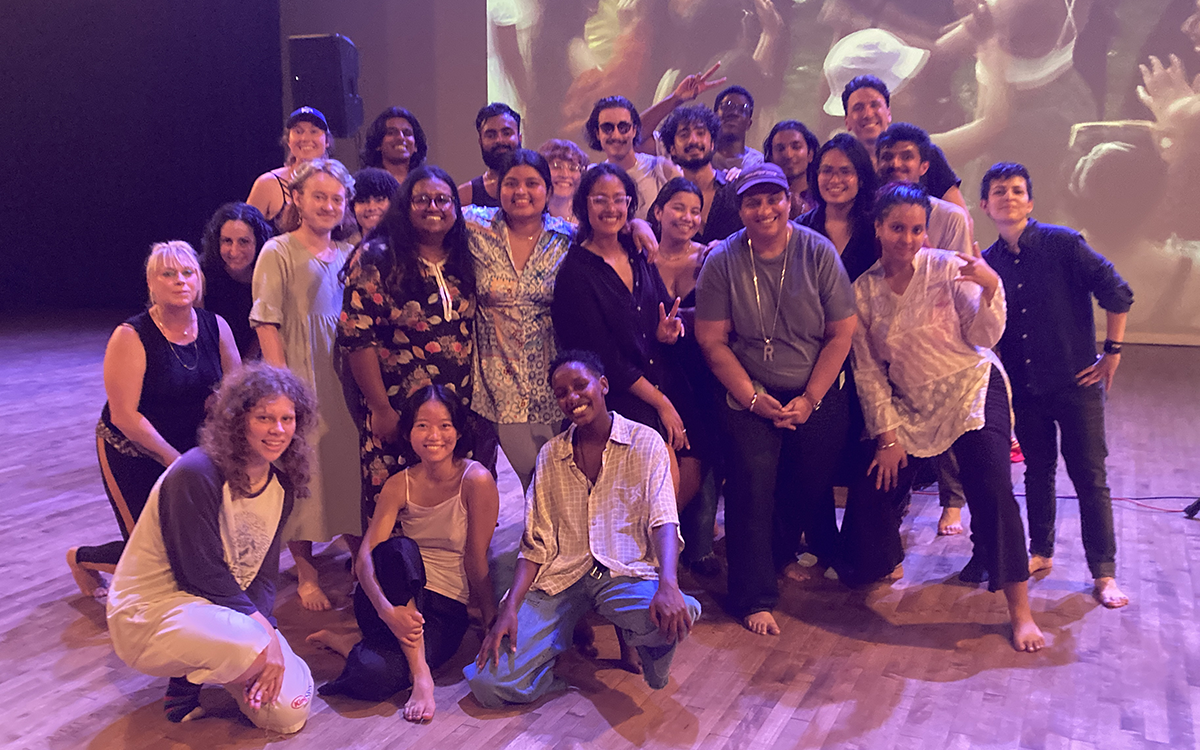DJ Rekha Visits the Carriage Barn Concert Series
One evening earlier this month, students arrived at the Martha Hill Dance Theater in groups of four and five. Faculty Joseph Alpar waved them into the room. He knew that there would be a good crowd; he had been telling people about the event since the start of the term.

As the music started and more people arrived, students took off their shoes, stepped onto the sprung wood dance floor, and were transported to a vibrant night club. This was a show of DJ Rekha, a New York City-based DJ, producer, activist, and curator known for pioneering Bhangra music, a popular music form associated with the Punjabi diaspora in Britain. DJ Rekha was visiting Bennington as a part of the Carriage Barn Concert Series organized by Alpar and faculty Senem Pirler.
“Our goal as curators of the Carriage Barn Series is to bring performers who might energize and challenge our students to push their own boundaries as musicians, sound practitioners, and performers,” Alpar said. “We want students and the wider Bennington community to experience a diverse array of music and sound, crossing genres, cultures, and time periods. Often these concerts directly tie into coursework at Bennington. We also want students to come away from the concert hall inspired.”
Rekha’s show was the third of six influential and boundary-pushing guest performers and scholars in the series. Each performance and discussion highlights the music and lives of Black, indigenous, people of color, queer, female-identified, and non-binary performers and artists.
Rekha has shared the stage with AR Rahman, Yoko Ono, the Roots, and M.I.A. and has performed in festivals, clubs, and community spaces worldwide, including the inaugural Women’s March and Obama’s White House, London Mela, 5X Fest, SXSW, and Sundance.
“Our vision for the Carriage Barn Music series is to bring exceptional practitioners in sound and music to Bennington community.” said Pirler. “These remarkable practitioners happen to be the members of historically and currently marginalized communities, and we are thrilled to be able to offer a space of exchange between our students and these incredible artists.
More than 50 students and several faculty and staff danced to traditional drum-based music fused with elements of reggae, ragga, hip-hop, rock, soul, and dance. Students in a large circle coordinated their movements. The circle expanded and contracted with the tempo of the music. Others danced in smaller groups. Two students, at times, used the margins of the dance floor for broad improvisations.
Meanwhile, a light show illuminated the dancers and a screen behind Rekha flashed video of people dancing, colorful graphics, and disco balls.
When Rekha announced the end of their set, the crowd chanted, "One more, one more, one more." They obliged, and the crowd danced with even greater energy for the knowledge that the night was drawing to a close.
At about 10:00 pm, when the music ended, students approached Rekha to thank them and talk about music, including how Bollywood had co-opted and popularized the Bhangra songs they had played.
"It was a very good crowd. I often come out and dance at the end," Rekha remarked. "Not with this crowd; they were too good."
Students danced intensely for nearly 2 hours. As they left, they seemed not exhausted but renewed.
"We had a really good time. This is how we dance at home,” said Apurba Alamgir '25. She is from Bangladesh. “The sound of the footsteps on the dance floor was amazing.”
One student called out that someone should get married, so they could all dance like this again. The others agreed. They should definitely do this more often.
“I was craving for this for so long,” said Sinha Binte Babul ’25.
Rekha also visited Alpar’s class, “The Musical ‘Other’: Exoticism, Appropriation, and Multiculturalism” the following morning for a conversation about the roots of their music and its evolution.
“DJ Rekha’s set in Martha Hill left everyone exhilarated, exhausted, and joyful,” said Alpar. “It was a raucous dance party that none of us will soon forget.”